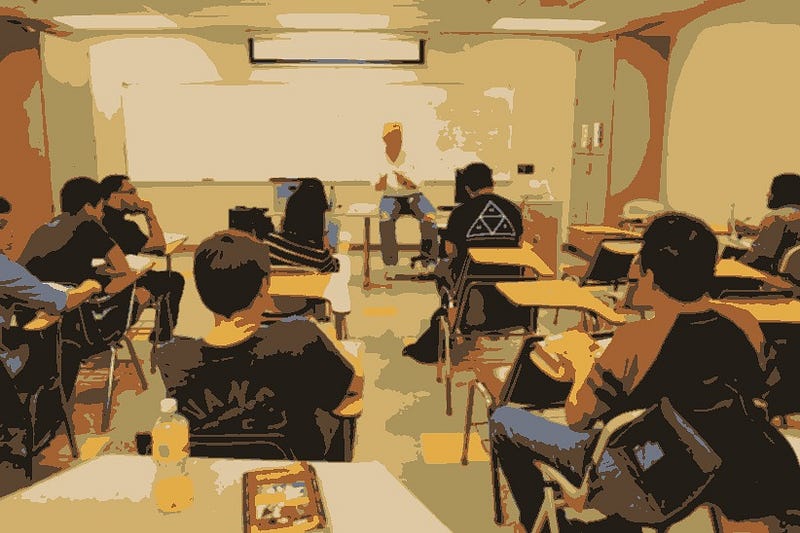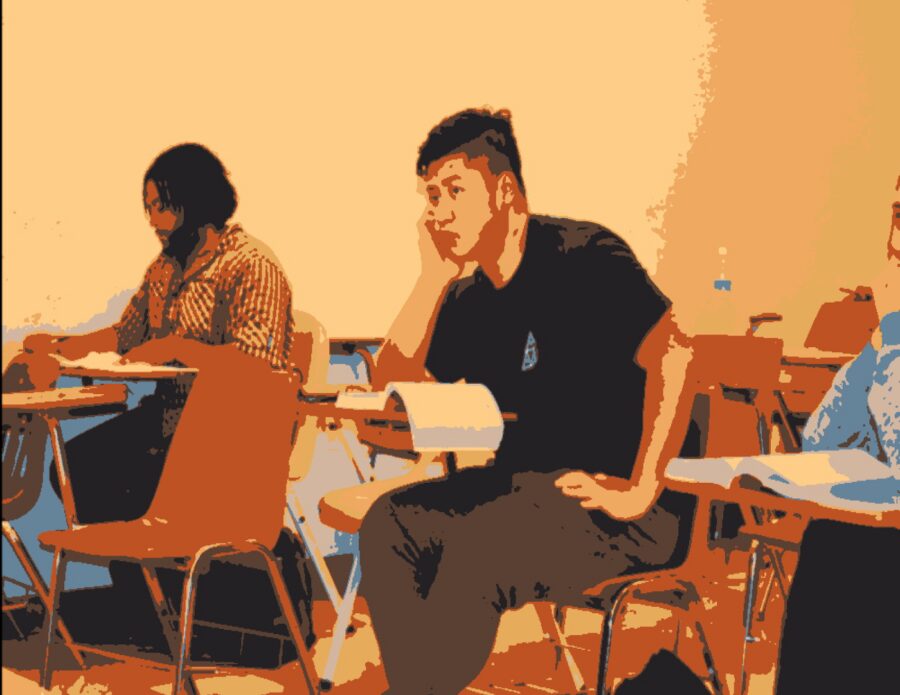#Slacktitude
(N.) Referring to Student Attitudes: Expecting to be able to Slack-off & Make CEO, Top-Dollar Salaries
I want to be rich. I want the latest iPhone, a new laptop, a shiny car, a big house, a pedigree pet, and I don’t want to have to work too hard for it. I want all of the flashy stuff successful people have, without all of that hard work stuff it took for them to get it. The answer to all future money woes? Pursue a college degree, land a dream job, be the next Steve Jobs, or winning the lottery would be great too!
Call it laziness, entitlement, or #Slacktitude, but this seems to be the mentality of the majority of my college peers who want to be successful overnight without any effort, and if I’m being super honest with myself, at times — just a tinsy bit — #Slacktitude might just apply to me too.
Looking around most classrooms, I spot students texting, zoning out, or otherwise half-engaged in the thoughtful lessons, painstakingly prepared by professors who are eager to share their knowledge and excitement of their chosen fields with students whose eyes have long since glazed over. While professors consider acrobatics to engage students, some students barely manage to keep their eyes open through lectures, while others blatantly doze-off in the front row; their bodies making that tell-tale drooping slowly forward then jerking suddenly back motion. I see it at least once per semester in each of my classes.
While I am not typically the student texting in class and trend on being more of a teacher’s pet, even I catch myself choosing lingering bouts of procrastination over doing my work on time.
If I stop to ask myself why I’ve waited until the last-minute, yet again, to complete an assignment — barring any major life catastrophes — it’s usually because, like Thomas the Train, “I think I can.” Only, I think I can binge-watch Netflix, clean my room, have a second midnight snack around three in the morning, all the while completing an assignment — and still turn it in for an A grade that following morning.
Sometimes, I’m right.
Other times, it bites me in the GPA big time.
Each time I find myself having to console my precious GPA after taking a preventable whooping, I take the opportunity to fact-check myself.
With employers across the nation complaining of employees who can’t write, and top universities implementing entrance and exit exams as well as more stringent requirements to screen for quality students, now, more than ever, is the time to step-up my A-game to maintain a much-needed competitive edge among a generation anticipated to be the most indebted graduating class.
“Did I give my A-game?” I ask myself. All excuses aside, when the answer is “No,” I realize that I shouldn’t have been surprised by my final grade. Yet each time I was, at least a little, because I had hoped for more: more from myself, my professor, time-management skills, or latent good karma.
This perspective, and perhaps grandiose sense of self, is purported to be common among the Millennial generation. In fact, an SNL, Saturday Night Live, skit highlighted this phenomenon of entitlement and laziness: “Beautiful twenty-somethings search for the love and success they’re entitled to, on The Millennials.” The skit exemplifies Millennials who want a lot, without wanting to do a lot to earn the things of their desires: #Slacktitude.
But where in the world does #Slacktitude come from? Are we Millennials really that full of ourselves, lazy, or are we simply naive?
Perhaps some of us are, and the answer really is that simple — but I think for the most part, there are other contributing factors to #Slacktitude, some of which support our denial of full responsibility.
Contributing Factors to #Slacktitude:

#Unprepared
According to the National Center for Education Statistics, 17.5 million undergraduate students were enrolled in degree-granting post-secondary institutions nationwide in 2013, with projections anticipating that number to increase to 19.6 million by 2024. The sheer volume of students in the US alone hints at the increasing stiffness of competition — yet, many students are ill-prepared to compete in both the academic and employment arenas.
One of the main reasons for #Slacktitude is students aren’t properly prepared. This leads to all of that diminished quality of work performance that employers and professors alike are complaining about.
Many students, like myself, arrive to two year and four year colleges way too confident for their actual abilities, only to find that their high school antics won’t quite cut it in university.
According to Cynthia Burnett, a professor and counselor at Mt. SAC, many of the students at Mt. SAC come in below the college level and have to work their way up to being able to study college-level course work: they are doing English 67, then English 68, and then English 1A, so they have three classes before they get through Freshman composition — and then they are doing Math 50, Math 51, and then 71, maybe 71A and then 71B, so they are doing all of those classes before they even get to college level mathematics.

In addition to being under-prepared and having so much to do, Burnett notes that there is a difference in the expectations in terms of academic rigor that many students may not have expected, which contributes to negative student attitudes and mentality about pursuing higher education.
“It’s a perfect storm,” Burnett said. “Students enter into this tornado and don’t know how to get out of it.”
Burnett attributes the trends of pursuing higher education at the collegiate level to a combination of factors — ranging from a lack of preparedness in high school to an issue of student perspective. According to Burnett, there is a disconnect, often times, between studying academically and both determining and pursuing career aspirations.
Specifically, Burnett notes that students may not have been on the college prep-track in high school, may not have taken college seriously, or may be experiencing additional factors contributing to their unpreparedness, such as being a first-generation college student, experiencing financial hardships, or learning English as a foreign language.
Fundamentally, Burnett identifies the greatest contributing factor to trends in student performance and a lack of preparedness to the struggle and level of difficulty of catching up after getting behind academically.
“It’s not their fault, they are just trying to catch up, so they become consistently behind, more and more, and it becomes sort of insurmountable,” said Burnett, “It’s like pushing a rock uphill. They are really under prepared, and then they have so much to do.”

Adriana Trujillo, a 27-year-old psychology major at Mt. SAC, is exactly the type of student to which Burnett is referring. Trujillo recalls feeling inadequately prepared for pursuing a college degree out of high school, and attributes the increased expectations to the reason why many of her peers that transferred with her out of high school to Mt. SAC dropped out of college.
“By my second year, half of my peers had already dropped out because it was taking longer than expected to advance in the courses,” said Trujillo. “We weren’t prepared.”
As a student who has faced the challenge of being inadequately prepared, Trujillo attributes her lack of preparedness to the low standards set in her high school.
“There was no emphasis in education and bettering yourself. It was just getting those credits in, graduating, and pushing us out,” said Trujillo.
While Trujillo is certainly not alone in feeling that she was ill-prepared for college while in high school, she also accepts personal responsibility for her mentality in her early years of pursuing higher education — unlike the stereotype of most Millennials. “I didn’t take education seriously. I can honestly say that I didn’t appreciate education, not like I do now that I’m 27, and I’ve been here for quite awhile,” said Trujillo.
Burnett recognizes the difficulty of college without being prepared; however, she also maintains that it is the students’ duty to overcome their challenges.
“I’m not saying it wasn’t their own personal responsibility because sometimes people just didn’t do what they were supposed to do, but sometimes they were just pushing a rock uphill, and it’s just hard,” Burnett said.
Because pursuing higher education is hard, many students struggle to continuously give their full effort, while their attitudes often reflect an increased sense of entitlement. In other words, many students feel owed the opportunities to be successful and expect that others will provide them with the means of achieving their educational dreams. Rather than reflecting a “go-getter” attitude, they become disheartened by the amount of effort it takes to get a degree, and simply give up on the challenge, or begin slacking off while pursuing their educational goals.
Even if we weren’t fully prepared early on in our educations, as adults, it is our responsibility to become prepared.
#Distracted

“Students are more distracted than ever. They tend to check their digital devices, particularly, their smartphones, an average of 11.43 times during class for non-classroom activities. A solid 12 percent do texting, emailing, checking the time or other activities in class more than 30 times a day.” — Dian Schaffhauser, CampusTechnology
“Squirrel.”
My high school friends and I picked up on the trend of students getting distracted. Even then, it seemed like most students we came into contact with had, at least, a mild case of ADHD, Attention Deficit Hyper-Activity Disorder. We used to joke about how easily we were distracted by shiny objects and jokingly called out “Squirrel,” in moments that showcased our own distractions.
It’s probably no surprise, therefore, that one of the other pitfalls leading to #Slacktitude is the sheer volume of things competing for our attention — especially shiny things which often are more appealing than comparatively dull textbooks.
According to a survey of 675 students in 26 states, the most common reason for student’s digital habits in classrooms are “to stay connected” and “fight boredom.” The distraction of technology commonly causes students to not “pay attention” and to “miss instruction” from professors.
Burnett acknowledges that classes are boring for many students who are also often distracted by technology, both of which contributes to poor student performance.
Technology is a common area of blame for diminished student and work performance. However, the ease of access to social media through smart phones is not the only type of distraction which students face. Rather than a primary source of blame, the phenomenon of cell phone usage and technological distractions visible in the classroom and at work are likely symptoms of other issues — such as a lack of maturity, boredom, or personal hardship.
As a non-traditional student, transitioning from a decade of active military service into the college educational system, William Hickman, 31, anthropology major at Mt. SAC, identified the divorce process as one of the main distractions in his personal life which distracts him from his studies.
“Trying to be in the academic mindset when your mind wants to be into it, but your heart doesn’t, just takes away from studies,” said Hickman.
In addition to facing personal challenges that compete with his attempts to meet academic requirements, Hickman feels that he “isn’t quite there yet” in terms of feeling adequately prepared to transfer to a four year university. Regardless of his personal distractions, however, he believes he will be ready to transfer by next summer.
“Education is just one of those things: you either want it or you don’t, so you have to want it and just keep chugging,” said Hickman.
While Millennials can’t control all of the distractions that we might face, and certainly can’t control the teaching style of every professor we encounter, we can take small steps — such as turning off phones for class time — to mitigate in-class distractions.
#Misguided

“When you reach for the stars, you may not get one, but you won’t come up with a handful of mud either.” — Leo Burnett
“If at first you don’t succeed; try, try again.”
“You can do it; you can do anything that you put your mind to.”
“You’re special.”
“Wish upon a star…”
From an early age, many of us Millennials were taught to think very positively about our future prospects. So it’s no wonder that when we grow up, our more ambitious selves believe that we are the next rising stars, and defend our “awesomeness” whenever remotely challenged.
This inner belief in self is one of the more complicated elements of #Slacktitude. Students are misguided in their understandings of how to obtain the success they hope for, largely because they are misguided about their innate talents. We erroneously believe that special cases of success — like Steve Jobs, Elizabeth Homes, and other college drop outs — are commonplace when they are actually rare exceptions.
Similarly, we oversimplify the formula to becoming successful, often times, forgetting to hone the skills needed to be successful. Then we learn statistics and how “one in a million” we really are — a tough lesson to swallow while still being motivated to give our all.
Outside of trying to get a “good job” in the future, many students attend college without a clear sense of purpose, hoping that they will discover their futures along the way, or erroneously believe that the name of the institution alone is all that is needed to garner financial success.
Julie Yeh, a 22-year-old mathematics major, describes herself as a hardworking student in comparison to her peers. However, her primary goal for wanting to transfer to UCLA is for the name alone.
“It sounds good, sounds fancy, and sounds cool,” said Yeh, “That’s the only reason I want to go to UCLA.”
Opportunity, prestige, and improved financial prospects are three common associations with going to university and obtaining a postsecondary degree. However, reality might not be as “fancy” and “cool” as Millennials expect.
“It’s probably safe to say that one of the main reasons people go to college is to find a fancy, high-paying job when they’re done. But, as it turns out, a college education and a prestigious job title do not necessarily mean you’ll be raking in cash.” — Jacquelyn Smith, Business Insider
According to Burnett, at the end of the day, students are transferring because they hope that education will lead them to a better life, professional and educational goals; sometimes people transfer because they don’t know what they are doing, so they keep going, hoping both that “Eureka” will set-in and that their futures will just come upon them.
“Sometimes people transfer because it relates to their goals; sometimes people transfer because they don’t know what they are going to do, so they keep studying,” said Burnett.
However, simply transferring and getting the degree is not enough to land the dream job. According to a Forbes article, the top mistakes that students make in landing jobs outside of college are not applying for enough jobs, failing to do enough of their own networking, spending time on Facebook and YouTube when they should be using LinkedIn, believing that applying through an employer’s website is all they need to do, and taking no for an answer when they get no response from an employer.
While not every student in college is simply slacking-off, many do underestimate just what it takes to make their financial dreams come true. Therefore, by default, they fail to do enough of the leg-work to get the desired results.
Millennials face many challenges in pursuing their educational and career goals, and whatever the reason for the temptation to slack off, in order to get all of the things we commonly want, we’re going to have to put in the effort to get them.
Original Photos By Arian Soro and Olivia Young. Photo Illustration by Sadies Céng; with thanks to Jessica Fuller







